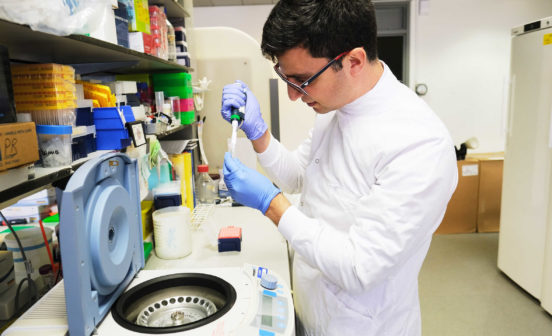Prevention Young people with ulcerative colitis at risk due to low adherence to prescribed medication

Nearly 70 per cent of adolescents and young adults with ulcerative colitis stop taking medication to treat the disease within a year of diagnosis. Ulcerative colitis is an inflammatory bowel disease (IBD) that causes inflammation and ulcers in the intestine affecting around 200,000 people in the UK. Failure to take medication to treat the disease can result in frequent relapses, severe disease and a higher risk of colon cancer. It can also lead to a reduced quality of life and higher healthcare costs to treat complications, such as through surgery.
The findings come from a study led by researchers at Imperial College London, University College London and St George’s University London. It was funded by the NIHR Imperial BRC and supported by the NIHR Applied Health Research (ARC) programme for Northwest London and the NIHR School for Public Health Research.
They found that a quarter of adolescents and young adults with ulcerative colitis discontinued their treatment after one month and 69 per cent within a year of diagnosis. They also found that residents in deprived postcodes were more likely to discontinue treatment compared to those who live in more affluent postcodes, something they suggest may be related to the cost of prescriptions.
Five-fold risk
The findings of the study may mean that adolescents and young adults diagnosed with ulcerative colitis are at risk of early relapse as not taking medication as prescribed, known as non-adherence, is associated with a five-fold risk of disease relapse compared to those whose adherence is over 80 per cent.
The researchers say the results show that the first year of starting lifelong therapies amongst individuals diagnosed with ulcerative colitis is a critical window to improve adherence for adolescents transitioning to young adulthood and those from deprived postcodes. They suggest that these patients should be actively followed up by GPs to see if they are taking their medications and if they can afford them, as well as discuss with them what to do if symptoms stop and start. They also suggest that alerts should be placed on health records to remind GPs to review these patients.
The study is one of the largest population-based cohort studies of new cases of ulcerative colitis in adolescents and young people.
Global rise
Professor Sonia Saxena, Professor of Primary Care and Director of the Imperial Child Health Unit in the School of Public Health at Imperial College London, said: “Ulcerative colitis is a condition that is rising globally in younger populations. If left untreated, young people could suffer from symptoms such as diarrhoea, abdominal pain or even seeing blood in their stool for years. Alternatively, there may be active inflammation in the gut that does not result in symptoms or visible signs but still causes damage.
“There are therapies that can put the condition into remission if taken as prescribed. However, our study shows that many adolescents and young adults are stopping their medication within a year of being diagnosed. This is concerning as they are at risk of their condition returning and further complications. It can also lead to severe complications such as surgery to remove part of the gut.
“As doctors, this study shows we need to be keeping a close eye on patients, particularly within the first year of starting medication. We should check if these patients are getting their medications and whether they have difficulty paying for them, We should also use the opportunity to talk through any recurring symptoms and how to access advice from providers such as a nurse specialist. I know that this is extra work for very busy clinicians, so it is important that support groups also help get this message out to those young people with ulcerative colitis.”
Ulcerative colitis
Typical symptoms of ulcerative colitis include diarrhoea, rectal bleeding and abdominal pain. The condition can develop at any age but is most often diagnosed in people between 15 and 25 years old. Globally, new cases of this inflammatory bowel condition are rising in younger populations.
Drugs called 5-aminosalicylic acids (5-ASAs) are used to treat ulcerative colitis. They help prevent flare-ups and reduce inflammation. International guidelines recommend that 5-ASA treatment should start promptly after diagnosis and continue long-term to maintain remission. However, estimates suggest medication adherence rates in young people are lower than in adults with IBD and far less is known about the extent and timing of discontinuation.
Researchers wanted to determine rates and risk factors for discontinuation and adherence to oral 5-ASAs in children and young adults in primary care. They analysed data from the UK Clinical Practice Research Datalink of 607 children and young adults aged 10-24 diagnosed with ulcerative colitis between 1998 and 2016. They analysed the number of individuals who started oral 5-ASAs maintenance treatment within six months of their recorded diagnosis date and followed up cases for one year. They also used socio-demographic factors such as sex, age and a postcode-based measure of socioeconomic deprivation called the Index of Multiple Deprivation (IMD) to identify potential predictors of discontinuation and adherence.
The team found that a quarter discounted treatment after one month and 69 per cent of individuals discontinued within a year of starting. Discontinuation was higher among those aged 18-24 years (74%) than young groups –10-14 (61%) and 15-17 (56%). The researchers suggest the higher risk of treatment discontinuation and poor adherence during the transition from adolescence to adulthood may be explained by the loss of support from caregivers who encourage adherence in adolescents and provide financial and practical support.
Risk factors
The team also found that individuals in deprived postcodes were more likely to discontinue treatment compared to those who live in affluent postcodes. The researchers suggest that monthly prescription costs may be a factor in low adherence in more deprived postcodes.
The team plans to carry out a further study to understand more about the reasons for low medication adherence.




